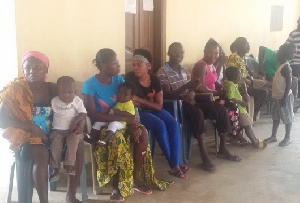Schistosomiasis, also known as bilharzia, a chronic disease caused by parasitic worms, is on the increase, particularly among children in Prestea Himan, a mining community in the Western Region.
The disease which is characterised by blood in the urine, is common in the area partly because the community lacks safe drinking water.
The people, therefore, have no alternative but to resort to some streams and rivers already polluted in the area as their source of water.
Apart from drinking from the rivers and streams, most of the children are also fond of bathing and swimming in those water bodies.
Other symptoms of bilharzia also include fever, headache, muscle pain, diarrhoea and respiratory symptoms.
This came to light during a health screening exercise organised for the people in the mining community by the chief of the area, Nana Nteboah Prah III, after a four-hour clean-up exercise in the community.
Over 1,000 residents of Prestea Himan benefited from the screening exercise free of charge.
The chief of the area single handedly sponsored the health screening at a cost of over GHc10,000.
The nurses and the medical doctor of the Prestea Government Hospital were at hand to take the people through health education, and administered drugs when necessary.
Speaking to DAILY GUIDE in an interview, Dr Alex Issah Adam Zakaria, medical doctor of the hospital, confirmed that most of the people, particularly the children who were screened during the exercise were diagnosed of bilharzia.
He mentioned that blood was found in the urine of most of the children who presented themselves for screening because they did not have safe source of drinking water, adding that the disease would continue to persist if the water situation in the community does not change.
Dr Zakaria urged parents to seek early treatment for their children because it could lead to impotence.
The medical doctor also appealed to the teachers in the community to educate their pupils and students on the dangers of bilharzia and to advise them to desist from swimming in rivers.
He added that early treatment would prevent the effect of the disease on the victims since his outfit was prepared to curb the spread of the disease.
Dr Zakaria mentioned other common diseases that were detected as anaemia and malaria, adding that the residents were educated on how to prevent the diseases.
According to him, malaria was on the increase in the area partly due to the activities of illegal miners also known as ‘galamsey’ operators.
He noted that the ‘galamsey’ operators normally created trenches full of water and do not cover them adding, “This situation breeds mosquitoes that cause malaria.”
Health News of Wednesday, 15 July 2015
Source: Daily Guide
Bilharzia cases increases in Prestea
Entertainment
















